How Alibaba uses big data to combat fake cigarettes and pesticide
Alibaba’s anti-counterfeit technology efforts have expanded from online to offline
Image Credit: 72soul / 123RF Stock Photo
Fake products are a definite thorn in the flesh of Alibaba, China’s largest e-commerce company. Alibaba has developed cutting-edge technology to counter the problem, and set up a 2,000-employee division to crack down on counterfeit goods.
An incident that happened back in April initiated the crackdown on fake goods this year. Back then, Alibaba spotted a network selling counterfeit Samsung RAM devices, involving three online stores, whose sales revenue over three months totalled more than RMB1 million (US$144,000), according to figures provided to AllChinaTech by Alibaba.
The visible online part is only the tip of the counterfeit RAM device iceberg. After its discovery, local police spent three months investigating; they eventually raided 13 manufacturing and sales sites, and confiscated over 15,000 counterfeit RAM devices valued at more than RMB120 million (US$17 million).

Cases for fake RAMs. (Image Credit: Alibaba)
Also Read: Alibaba avoids US counterfeiting naughty list
Alibaba is haunted by counterfeit products. The International Anticounterfeiting Coalition, a well-known anti-counterfeiting group, in May revoked Alibaba’s membership over concerns from international brands and the dropout of membership from companies, including Tiffany and Gucci.
In an effort to raise investors’ confidence in Alibaba, Jack Ma, Alibaba’s executive chairman, in June assured investors that the company would be the champion if there were a to be a fake product spotting competition held held between Alibaba’s Tmall, its rival JD.com, and offline companies. As part of the endeavour, the company have actively participated Operation Cloud Sword, an effort by the local government of China’s Zhejiang province to tackle the issue of rampant counterfeit products.
To fight the battle, Alibaba has developed scanning and detection models powered by big data, it claims. The models detect abnormal online stores on Alibaba’s e-commerce platforms, including Taobao, by analysing a variety of factors, including the complexity of online stores, IP addresses, and abnormal customer reviews.
According to Alibaba, stores that sell fake products tend to use the basic template provided by Taobao, not bothering to add more functions and decorations on top of it.
Also Read: Chinese delivery companies are selling ‘empty’ packages to boost e-commerce sales
Most criminals use someone else’s certificate of identification to avoid being caught. Alibaba’s technology identifies related accounts under the same internet environment – the same Wi-Fi or computer – to discover criminals’ real identities.
Aside from RAM devices, local government in the eastern Chinese city of Pinghu in July seized RMB30 million (US$4 million) worth of fake cigarettes, with the help of Alibaba’s big data technology.

Cases for fake cigarettes. (Image Credit: Alibaba)
To trace the source and production locations of counterfeit goods, Alibaba collects counterfeit goods’ logistics information and other data throughout the capital chain via Alibaba’s AliPay, a sign that the tech giant’s anti-counterfeit technology efforts have expanded from online to offline.
Aside from the crackdown on counterfeit Samsung RAM devices and cigarettes trade domestically, technology also helped a cross-border counterfeit goods crackdown. In March 2016, Customs in the eastern Chinese city of Ningbo used Alibaba’s big data technology to spot counterfeit pesticide products being exported to Cambodia.
—
The article How Alibaba uses big data to combat fake cigarettes and pesticide first appeared in AllChinaTech.
Heather is a writer at ACT. She is passionate about literature, photography and technology. She graduated from Shanghai University of International Business and Economics with a Master’s Degree. Writer to her: heather[at]allchinatech.com
The post How Alibaba uses big data to combat fake cigarettes and pesticide appeared first on e27.



